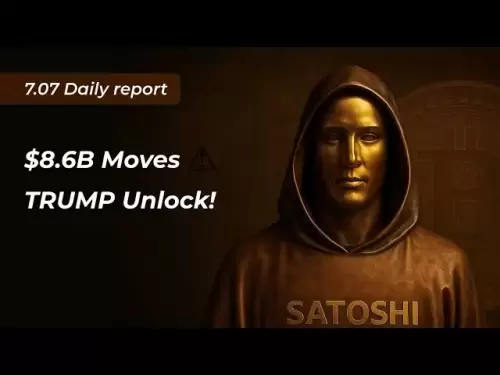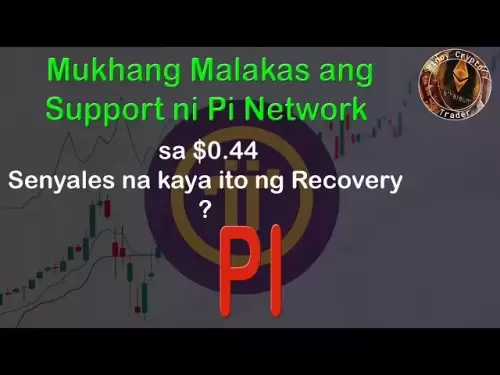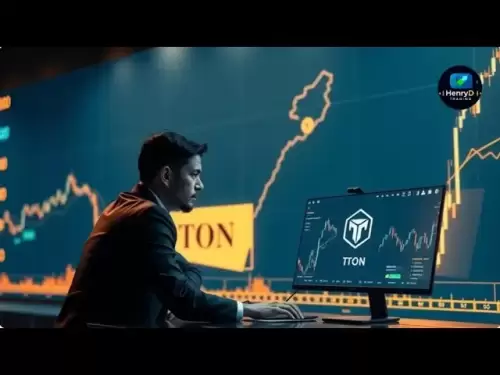-
 Bitcoin
Bitcoin $108,708.8110
0.60% -
 Ethereum
Ethereum $2,561.6057
1.91% -
 Tether USDt
Tether USDt $1.0001
-0.03% -
 XRP
XRP $2.2795
0.57% -
 BNB
BNB $662.2393
1.00% -
 Solana
Solana $153.1346
3.74% -
 USDC
USDC $1.0000
0.00% -
 TRON
TRON $0.2877
0.97% -
 Dogecoin
Dogecoin $0.1710
3.93% -
 Cardano
Cardano $0.5871
1.61% -
 Hyperliquid
Hyperliquid $39.6663
1.68% -
 Sui
Sui $2.9032
0.79% -
 Bitcoin Cash
Bitcoin Cash $496.1879
1.71% -
 Chainlink
Chainlink $13.5807
3.01% -
 UNUS SED LEO
UNUS SED LEO $9.0777
0.61% -
 Stellar
Stellar $0.2514
4.51% -
 Avalanche
Avalanche $18.1761
1.86% -
 Shiba Inu
Shiba Inu $0.0...01173
1.72% -
 Toncoin
Toncoin $2.8010
-4.23% -
 Hedera
Hedera $0.1594
3.21% -
 Litecoin
Litecoin $87.0257
-0.53% -
 Monero
Monero $319.1217
1.79% -
 Polkadot
Polkadot $3.3853
0.68% -
 Dai
Dai $0.9999
-0.01% -
 Ethena USDe
Ethena USDe $1.0003
0.02% -
 Bitget Token
Bitget Token $4.3420
-0.97% -
 Uniswap
Uniswap $7.3772
1.39% -
 Aave
Aave $286.6277
5.61% -
 Pepe
Pepe $0.0...09994
2.33% -
 Pi
Pi $0.4589
1.76%
Why does an "Out of Gas" error occur when transferring money in an Ethereum wallet?
An "Out of Gas" Ethereum transaction error means insufficient computational resources (gas) were allocated; either the gas limit was too low, or the gas price was uncompetitive, preventing miner inclusion.
Mar 22, 2025 at 06:22 pm
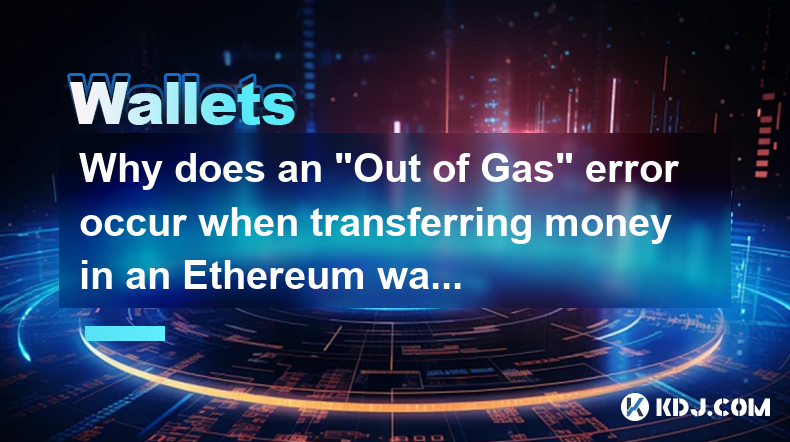
Why does an "Out of Gas" error occur when transferring money in an Ethereum wallet?
The "Out of Gas" error is a common frustration for Ethereum users attempting transactions. It essentially means your transaction ran out of computational resources before it could be completed on the Ethereum network. Think of "gas" as the fuel that powers transactions on the Ethereum blockchain. Every operation, from sending ETH to interacting with a smart contract, requires a certain amount of gas. If you don't provide enough, the transaction fails.
The amount of gas required varies significantly depending on the complexity of the transaction. A simple ETH transfer needs far less gas than a complex interaction with a decentralized application (dApp) involving many computations. The gas price, measured in Gwei (a billionth of an ETH), is determined by network congestion. Higher network congestion means a higher gas price, as miners prioritize transactions with higher fees.
This leads to the crucial point: Insufficient gas can manifest in two ways. You might have set an insufficient gas limit, meaning you didn't allocate enough computational resources for the transaction to complete. Or, the gas price you offered might have been too low to incentivize miners to include your transaction in a block. Miners are incentivized to process transactions that offer the highest gas prices, so if yours is too low, it might be ignored.
Let's break down how these factors contribute to an "Out of Gas" error:
- Insufficient Gas Limit: This is the most common cause. Ethereum wallets often provide an estimated gas limit, but this is just an estimate. Complex transactions, especially those involving smart contracts, might require more gas than initially predicted. Always double-check and consider increasing the gas limit if the transaction fails. Many wallets allow for a percentage increase above the estimated limit.
- Too Low Gas Price: Even with a sufficient gas limit, if the gas price is too low, your transaction might not be picked up by a miner. Miners are more likely to prioritize transactions offering higher fees, as this maximizes their profit. If the network is congested, you need to offer a competitive gas price. You can monitor current gas prices on various websites and tools dedicated to Ethereum network data.
- Transaction Complexity: The nature of the transaction plays a vital role. Simple ETH transfers require minimal gas, while interacting with sophisticated smart contracts, particularly those with many operations or large amounts of data, consumes significantly more gas.
- Network Congestion: High network activity increases the gas price. During periods of peak usage, you might need to offer a much higher gas price to ensure your transaction is processed in a timely manner. This is why transactions sometimes seem to stall during periods of high network activity.
Understanding how gas works is fundamental to successfully using Ethereum. While most wallets offer default settings, understanding the gas limit and price allows for more control and avoids frustrating "Out of Gas" errors. Always check the estimated gas values and consider increasing them, especially during periods of high network congestion. Remember that increasing the gas limit doesn't necessarily mean you'll spend more ETH; it just allocates more computational resources. The actual cost depends on the gas price.
Common Questions and Answers:
Q: What happens to my ETH if I get an "Out of Gas" error?
A: Your ETH is not lost. The transaction simply fails, and your funds remain in your wallet. You'll need to try the transaction again, possibly increasing the gas limit and/or the gas price.
Q: How can I find the optimal gas price?
A: Several websites and tools provide real-time gas price estimations. These tools analyze the current network congestion and suggest competitive gas prices. It's advisable to monitor these tools and adjust your gas price accordingly. You can also choose a higher gas price to prioritize your transaction.
Q: Can I reuse the same gas limit for different transactions?
A: No. The gas limit is transaction-specific. A simple ETH transfer requires far less gas than a complex interaction with a smart contract. Always check the estimated gas limit for each transaction and consider increasing it as needed.
Q: What is the difference between gas limit and gas price?
A: The gas limit is the maximum amount of gas you're willing to spend on a transaction. The gas price is the amount you're willing to pay per unit of gas. Think of the gas limit as the total fuel in your car, and the gas price as the cost per gallon.
Q: My transaction is pending for a long time; is it an "Out of Gas" error?
A: Not necessarily. A pending transaction might simply be waiting to be included in a block due to high network congestion, even if the gas price and limit were sufficient. However, if it remains pending for an extended period, it could be due to an insufficient gas price.
Q: Are there any ways to avoid "Out of Gas" errors?
A: Yes, several strategies can help. These include using reputable wallets with accurate gas estimation tools, carefully reviewing gas limit and price suggestions before confirming transactions, monitoring network congestion, and understanding the complexity of the transaction you're attempting. Increase the gas limit and price by a percentage if a transaction fails. Also, consider off-peak hours for transactions to reduce congestion and gas costs.
Disclaimer:info@kdj.com
The information provided is not trading advice. kdj.com does not assume any responsibility for any investments made based on the information provided in this article. Cryptocurrencies are highly volatile and it is highly recommended that you invest with caution after thorough research!
If you believe that the content used on this website infringes your copyright, please contact us immediately (info@kdj.com) and we will delete it promptly.
- Bitcoin Wallet Hack? Coinbase Exec Sounds the Alarm on $8B Whale Movement
- 2025-07-07 18:30:12
- Mercado Bitcoin, Tokenization, and XRP Ledger: A Latin American Power Play
- 2025-07-07 18:30:12
- XYZVerse, Wall Street, and the Crypto Upswing: What's the Deal?
- 2025-07-07 19:10:12
- AI, Web3, and Communities: Building the Future Together
- 2025-07-07 19:10:12
- AurealOne: A Promising Early-Stage Metaverse Project
- 2025-07-07 19:15:12
- Dogecoin Price: Crypto Market Analysis and the Musk Effect
- 2025-07-07 19:50:12
Related knowledge

How to cancel a pending transaction in Phantom wallet?
Jul 03,2025 at 07:21pm
Understanding Pending Transactions in Phantom WalletA pending transaction in the Phantom wallet occurs when a user initiates a transfer or interaction with the Solana blockchain, but it hasn't yet been confirmed by the network. This can happen due to various reasons such as low transaction fees, network congestion, or incorrect gas settings. It's import...

How to see the estimated value of my tokens in Phantom wallet?
Jul 04,2025 at 12:21am
What is Phantom Wallet?Phantom wallet is one of the most popular cryptocurrency wallets designed for the Solana blockchain. It allows users to store, send, receive, and manage various tokens built on Solana, including SPL tokens and NFTs. The wallet offers a user-friendly interface, making it accessible for both beginners and advanced users in the crypt...

How to lock my Phantom wallet extension?
Jul 03,2025 at 11:14am
What Is the Phantom Wallet and Why Lock It?The Phantom wallet is a popular non-custodial cryptocurrency wallet designed for interacting with the Solana blockchain. Supporting both browser extensions and mobile apps, Phantom allows users to store, send, receive, and stake SOL tokens, as well as interact with decentralized applications (dApps). Securing y...

Does Phantom wallet offer two-factor authentication (2FA)?
Jul 03,2025 at 09:00am
Understanding Phantom Wallet and Its Security FeaturesPhantom wallet is a widely used non-custodial cryptocurrency wallet that supports the Solana blockchain. It allows users to store, send, receive, and interact with decentralized applications (dApps) seamlessly. As security is a top priority for any crypto wallet user, security features like two-facto...
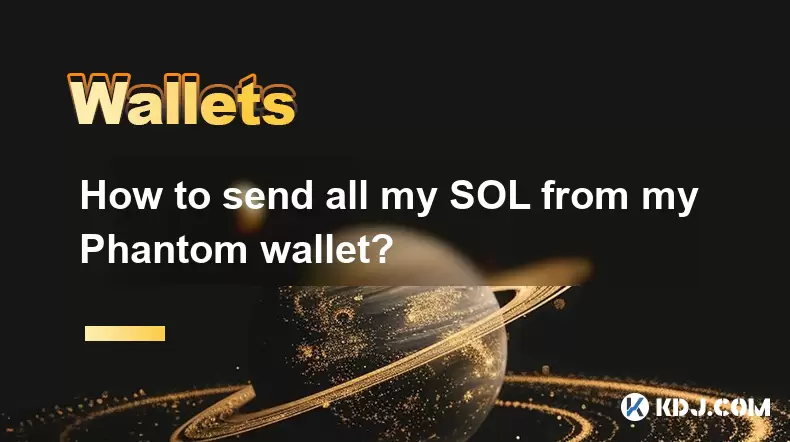
How to send all my SOL from my Phantom wallet?
Jul 06,2025 at 10:00am
Preparing to Send SOL from Your Phantom WalletBefore initiating any transaction, it is crucial to ensure that your Phantom wallet is fully set up and connected to the correct network. Phantom supports multiple networks, but for sending SOL, you must be on the Solana blockchain. Confirm this by checking the network indicator in the top-right corner of th...

What is "rent" on Solana and how does it affect my Phantom wallet?
Jul 02,2025 at 08:35pm
Understanding 'Rent' on SolanaIn the context of Solana, the term 'rent' refers to a storage fee that users pay for maintaining data on the blockchain. Unlike Ethereum, where storage costs are paid once via gas fees during contract deployment, Solana implements a recurring cost model to ensure efficient usage of network resources. This means that any acc...

How to cancel a pending transaction in Phantom wallet?
Jul 03,2025 at 07:21pm
Understanding Pending Transactions in Phantom WalletA pending transaction in the Phantom wallet occurs when a user initiates a transfer or interaction with the Solana blockchain, but it hasn't yet been confirmed by the network. This can happen due to various reasons such as low transaction fees, network congestion, or incorrect gas settings. It's import...

How to see the estimated value of my tokens in Phantom wallet?
Jul 04,2025 at 12:21am
What is Phantom Wallet?Phantom wallet is one of the most popular cryptocurrency wallets designed for the Solana blockchain. It allows users to store, send, receive, and manage various tokens built on Solana, including SPL tokens and NFTs. The wallet offers a user-friendly interface, making it accessible for both beginners and advanced users in the crypt...

How to lock my Phantom wallet extension?
Jul 03,2025 at 11:14am
What Is the Phantom Wallet and Why Lock It?The Phantom wallet is a popular non-custodial cryptocurrency wallet designed for interacting with the Solana blockchain. Supporting both browser extensions and mobile apps, Phantom allows users to store, send, receive, and stake SOL tokens, as well as interact with decentralized applications (dApps). Securing y...

Does Phantom wallet offer two-factor authentication (2FA)?
Jul 03,2025 at 09:00am
Understanding Phantom Wallet and Its Security FeaturesPhantom wallet is a widely used non-custodial cryptocurrency wallet that supports the Solana blockchain. It allows users to store, send, receive, and interact with decentralized applications (dApps) seamlessly. As security is a top priority for any crypto wallet user, security features like two-facto...

How to send all my SOL from my Phantom wallet?
Jul 06,2025 at 10:00am
Preparing to Send SOL from Your Phantom WalletBefore initiating any transaction, it is crucial to ensure that your Phantom wallet is fully set up and connected to the correct network. Phantom supports multiple networks, but for sending SOL, you must be on the Solana blockchain. Confirm this by checking the network indicator in the top-right corner of th...

What is "rent" on Solana and how does it affect my Phantom wallet?
Jul 02,2025 at 08:35pm
Understanding 'Rent' on SolanaIn the context of Solana, the term 'rent' refers to a storage fee that users pay for maintaining data on the blockchain. Unlike Ethereum, where storage costs are paid once via gas fees during contract deployment, Solana implements a recurring cost model to ensure efficient usage of network resources. This means that any acc...
See all articles





















